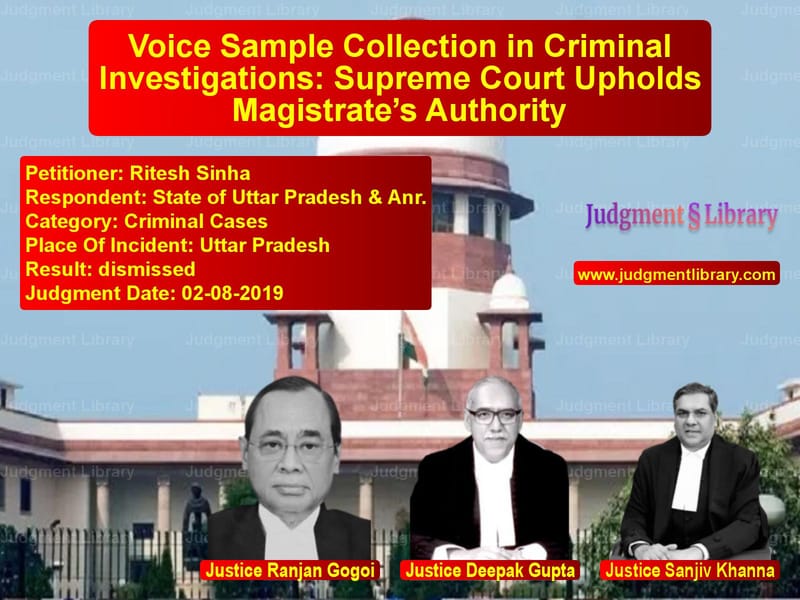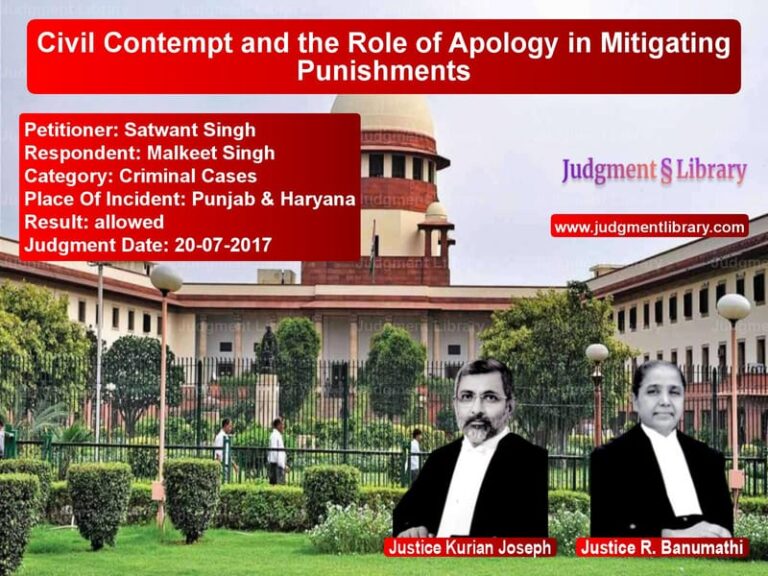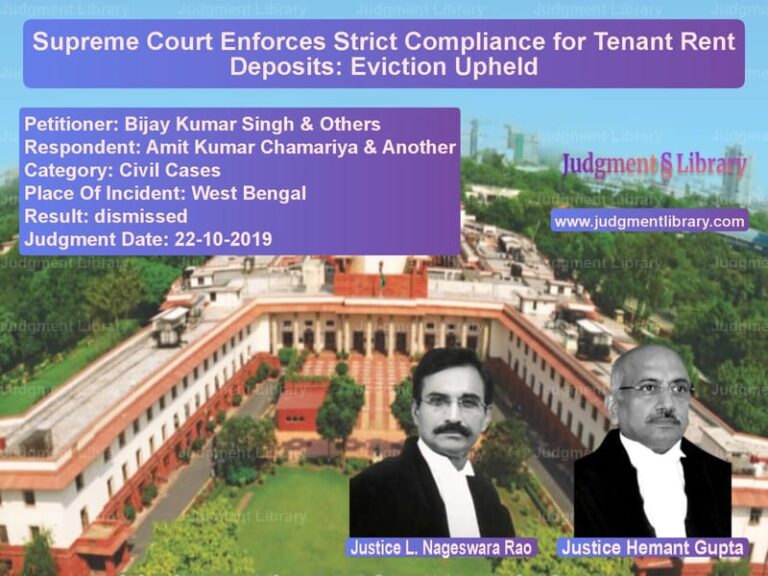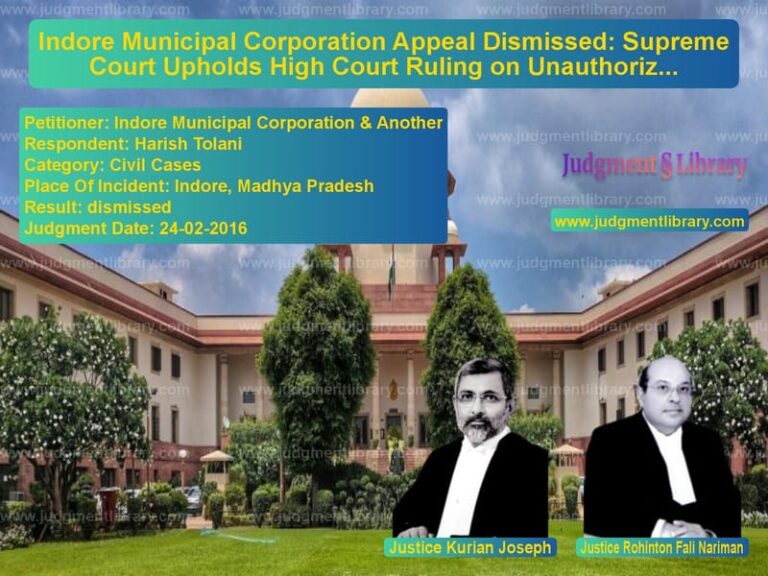Voice Sample Collection in Criminal Investigations: Supreme Court Upholds Magistrate’s Authority
The Supreme Court of India, in the case of Ritesh Sinha vs. State of Uttar Pradesh & Anr., examined the legality of compelling an accused to provide a voice sample during a criminal investigation. The judgment clarifies the scope of Article 20(3) of the Constitution and determines whether a Magistrate has the power to direct an accused to furnish a voice sample in the absence of explicit legislative provisions.
Background of the Case
On December 7, 2009, the in-charge of the Electronics Cell of Sadar Bazar Police Station, Saharanpur, Uttar Pradesh, filed an FIR against Dhoom Singh and the appellant, Ritesh Sinha. The allegation was that they were collecting money from individuals by falsely promising them jobs in the police force.
During the investigation, the police arrested Dhoom Singh and seized his mobile phone, which contained recorded conversations. The investigating authorities wanted to verify whether the voice in those recordings belonged to Ritesh Sinha. Consequently, they filed an application before the Chief Judicial Magistrate (CJM) seeking permission to summon Sinha and record his voice sample.
The CJM, on January 8, 2010, directed Sinha to appear before the investigating officer and provide his voice sample. Sinha challenged this order before the Allahabad High Court under Section 482 of the Criminal Procedure Code (CrPC). The High Court dismissed his plea, prompting him to file an appeal before the Supreme Court.
Key Legal Issues
- Whether compelling an accused to provide a voice sample violates Article 20(3) of the Constitution, which protects against self-incrimination.
- Whether a Magistrate can authorize the collection of a voice sample in the absence of specific statutory provisions in the CrPC.
Arguments by the Appellant (Ritesh Sinha)
The appellant contended:
- Article 20(3) of the Constitution protects an accused from being compelled to be a witness against himself, which includes providing a voice sample.
- The CrPC does not contain any explicit provision authorizing a Magistrate to direct an accused to furnish a voice sample.
- The legislature had amended Sections 53, 53A, and 311A of the CrPC in 2005 but did not include voice sample collection, indicating a legislative intent to exclude it.
- The direction to provide a voice sample amounts to an unreasonable invasion of privacy.
Arguments by the Respondents (State of Uttar Pradesh)
The respondents countered:
- Providing a voice sample does not constitute self-incrimination since it does not convey personal knowledge or implicate the accused.
- Sections 53, 53A, and 311A of the CrPC allow for the collection of physical and biological samples (such as fingerprints, handwriting, and blood samples) for investigation purposes.
- The absence of an explicit statutory provision does not prevent a Magistrate from directing an accused to furnish a voice sample.
- The need for an effective investigation justifies the collection of voice samples to compare with recorded conversations.
Supreme Court’s Observations
1. Article 20(3) and Self-Incrimination
The Court ruled that the protection against self-incrimination under Article 20(3) applies only to testimony that is communicative in nature. It cited State of Bombay vs. Kathi Kalu Oghad (1961), where it was held that fingerprint impressions, handwriting samples, and specimen signatures do not constitute self-incriminatory evidence.
“The prohibition contemplated by Article 20(3) applies only to statements that are testimonial and self-incriminatory. Providing a voice sample, like fingerprints or handwriting specimens, does not constitute testimony.”
2. Magistrate’s Power to Direct Collection of Voice Samples
The Court examined whether a Magistrate has the inherent authority to order an accused to provide a voice sample despite the absence of an explicit provision in the CrPC. It observed:
“The power to direct the collection of voice samples must be read into the CrPC to ensure that investigations remain effective. The absence of an express provision does not preclude judicial interpretation to fill the legislative gap.”
3. Legislative Gap and Judicial Interpretation
The Court referred to the recommendations of the Law Commission of India’s 87th Report (1980), which suggested an amendment to the Identification of Prisoners Act, 1920, to include voice sample collection. However, no legislative action followed. The Court stated:
“The slow pace of legislative response should not hinder the effectiveness of criminal investigations. Judicial interpretation is necessary to ensure that legislative gaps do not obstruct justice.”
4. Privacy Concerns
Addressing the issue of privacy, the Court referred to the landmark judgment in K.S. Puttaswamy vs. Union of India (2017), which held that the right to privacy is not absolute and can be restricted in the interest of public safety and criminal justice.
“The right to privacy must yield to the legitimate interests of law enforcement. Voice sample collection is a minimal intrusion and serves the broader goal of justice.”
Final Verdict
The Supreme Court ruled:
- Compelling an accused to provide a voice sample does not violate Article 20(3) of the Constitution.
- A Magistrate has the authority to direct an accused to furnish a voice sample, even in the absence of explicit statutory provisions.
- The decision fills a legislative gap while ensuring that the investigation process remains effective.
- The appeals were dismissed, upholding the High Court’s decision.
Conclusion
This judgment clarifies the legal position regarding voice sample collection in criminal investigations. It upholds the balance between an individual’s rights and the necessity of effective law enforcement. The ruling sets a significant precedent for future cases, ensuring that investigative agencies can utilize modern forensic techniques while adhering to constitutional safeguards.
Petitioner Name: Ritesh Sinha.Respondent Name: State of Uttar Pradesh & Anr..Judgment By: Justice Ranjan Gogoi, Justice Deepak Gupta, Justice Sanjiv Khanna.Place Of Incident: Uttar Pradesh.Judgment Date: 02-08-2019.
Don’t miss out on the full details! Download the complete judgment in PDF format below and gain valuable insights instantly!
Download Judgment: Ritesh Sinha vs State of Uttar Prade Supreme Court of India Judgment Dated 02-08-2019.pdf
Direct Downlaod Judgment: Direct downlaod this Judgment
See all petitions in Fraud and Forgery
See all petitions in Bail and Anticipatory Bail
See all petitions in Judgment by Ranjan Gogoi
See all petitions in Judgment by Deepak Gupta
See all petitions in Judgment by Sanjiv Khanna
See all petitions in dismissed
See all petitions in supreme court of India judgments August 2019
See all petitions in 2019 judgments
See all posts in Criminal Cases Category
See all allowed petitions in Criminal Cases Category
See all Dismissed petitions in Criminal Cases Category
See all partially allowed petitions in Criminal Cases Category







